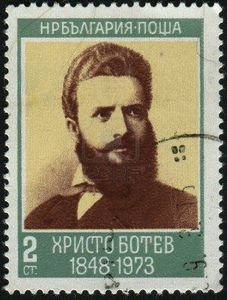54 pp. Poetry of the people. Frontispiece has photo of Poet. Endpapers slightly browned. Owners signature on first endpaper. Turquoise & white D/J is rubbed on corners 7 edges. Spine is sunned.
Hristo Botev was born on Dec. 25, 1847 in the town of Kalofer. After the start of the April Uprising, which had the goal to liberate Bulgaria from the turks and is considered the apogee of the fight for independence, Botev began organizing a troupe to enter Bulgaria and help the rebels.
On June 2, 1876, Botev's troupe engaged in its heaviest fight with the Turkish army. Botev was hit by bullet and died at the foot of the peak "Vola" in the Balkan, near the town of Vratza.
In 1875 Botev published his poetic works in a book called "Songs and Poems", together with another Bulgarian revolutionary poet and future politician and statesman, Stefan Stambolov. Botev's poetry reflected the sentiments of the poor people, filled with revolutionary ideas, struggling for their freedom against both foreign and domestic tyrants. His poetry is influenced by the Russian revolutionary democrats and the figures of the Paris Commune. Under this influence, Botev rose both as a poet and a revolutionary democrat. Many of his poems are imbued with revolutionary zeal and determination, such as My Prayer ("Moyata molitva"), At Farewell ("Na proshtavane"), Hajduks ("Haiduti"), In the Tavern ("V mehanata"), or Struggle ("Borba"). Others are romantic, balladic (Hadzhi Dimitar, perhaps the greatest of his poems), even elegiac.
